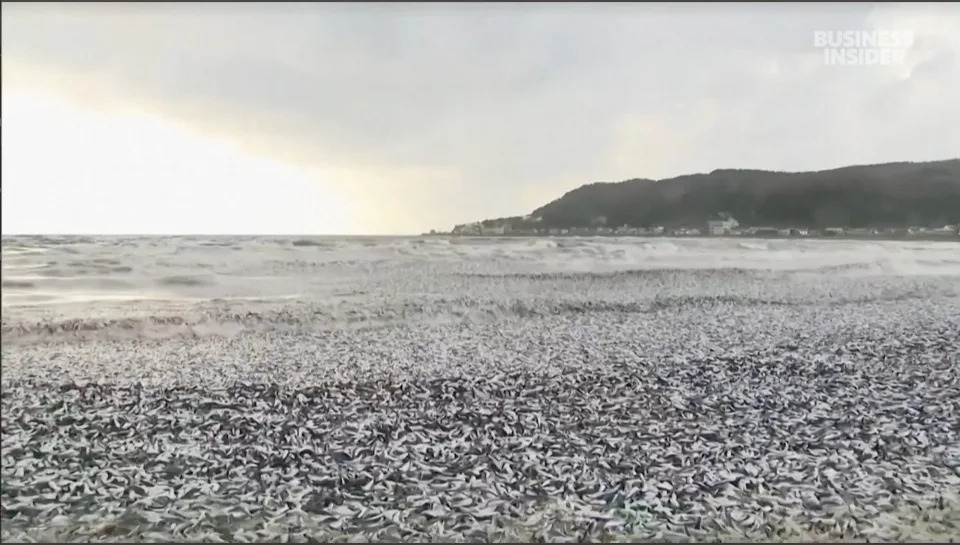Thibault Spirlet
Thu, December 14, 2023
About 1,200 tons of fish washed up on a beach in Hakodate, Japan, per AP.
City officials said in a statement that the cause was still unknown.
The fish may have been chased by bigger fish and died of suffocation, one researcher told AP.
An estimated 1,200 tons of fish have washed ashore on a Japanese beach — and local officials are struggling to explain why.
According to the Associated Press, the volume of sardines and mackerel found floating off the city of Hakodate, in the northernmost of Japan's main islands, was such that it extended across more than 0.6 miles, per officials.

1,200 tons of fish washed up on the beach in Hakodate, Japan.NTV via Associated Press
Takashi Fujioka, a researcher at Hakodate Fisheries Research Institute, said it was the first time he had observed such a phenomenon, per AP.
Fujioka speculated that the fish might have been chased by bigger fish, run out of oxygen while swimming together, and then been carried away by the waves.
"We don't know for sure under what circumstances these fish were washed up, so I do not recommend" eating them, Fujioka said, per AP.
In a statement released last week, the city of Hakodate said the cause of the incident remained unknown, but it urged the local population not to bring any of the fish home with them.
The city did not immediately respond to BI's request for comment.
This is not the first time such an event has occurred.
In 2019, thousands of fish washed up in the seaside resort of Hove, in southern England, per the local newspaper Argus.
That same year, California experienced a similar phenomenon, with thousands of Urechis caupo, also commonly known as "penis fish," washing up on Drakes Beach, about 50 miles north of San Francisco, per the BBC.
A year later, thousands of fish washed up dead on the shores of Barmouth, Wales, as ITV News reported at the time.
And in June 2023, tens of thousands of dead fish washed up on the shores of Texas's Gulf Coast. This was due to a lack of oxygen in the water resulting from a rise in temperature, Quintana Beach County Park said in a statement on Facebook.
A lack of oxygen can be caused by several factors, including excessive water extraction by farms, higher temperatures, nutrient overload, and poisoned water, experts told National Geographic.
To stop further incidents of this kind, the experts said, there needs to be policing of what humans dump into lakes and rivers, as well as limiting the amount of water humans pull out of them.
Another priority needs to be intensifying the fight against climate change, including the extraction of fossil fuels, so that maritime heatwaves become less common, they said.
Japanese officials say no link between mysterious mass fish deaths and Fukushima release
Arpan Rai
Thu, December 14, 2023

Japanese officials have junked reports that linked the deaths of tons of fishes along the shoreline in Hokkaido with the release of treated water from the Fukushima Daiichi nuclear power plant.
Around 1,200 tons of dead sardines and mackerels washed ashore and crowded about a kilometre-long stretch of the coastline in Hakodate city last week, leaving marine experts baffled.
The city administration was inundated with dozens of enquiries about the dead fish and requests to volunteer for collecting and disposing of the remains, government officials said.
While no official statement has been shared by Tokyo, a report in the British newspaper Daily Mail blamed the fish deaths in the northern prefecture on the water discharged from the decommissioned Fukushima nuclear plant. The Daily Mail suggested that the fish died three months after the controversial release of treated water from the nuclear power plant.
“We are concerned about the unsubstantiated information,” the fisheries agency said.
Its propagation promotion division said: “There have been no abnormalities found in the results of water-monitoring surveys. We are concerned about the proliferation of information that is not based on scientific evidence.”
Fishes sometimes wash up ashore in massive numbers when the waters they are in experience sudden change in temperature or when they are fleeing from predators like dolphins, according to the Hokkaido Research Organisation’s Hakodate fisheries experiment station.
The fishes found on the beach were likely a part of a school migrating towards south at this time of the year, the station said, reported Japanese newspaper Asahi Shimbun.
The dead fishes were being disposed of from the coastline using heavy machinery, city officials said, adding that the cleanup will go on till the end of December given the volume.
Photos of the incident showed thousands of tons of sardines and some mackerels on the shore, creating a sliver blanket along a stretch of beach about a kilometre (0.6 mile) long.
In August this year, thousands of tons of treated water was released from the Fukushima nuclear plant by the Tokyo Electric power company. The Fumio Kishida administration said it needed to discharge the water as part of a key step of its critical process of decommissioning the Fukushima Daiichi plant, including the removal of molten fuel.
The government later defended the accusations of unsafe water and said no radioactive anomalies were found in the released water.
No comments:
Post a Comment